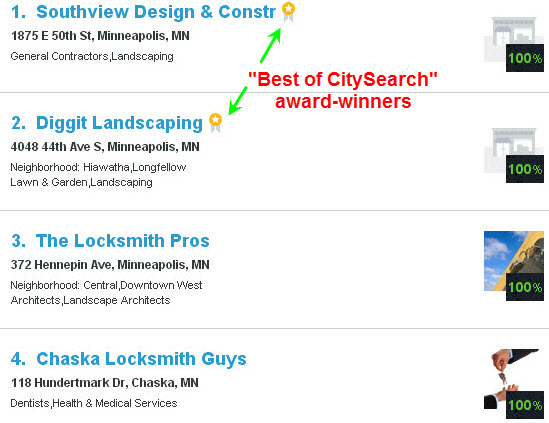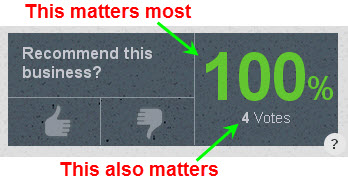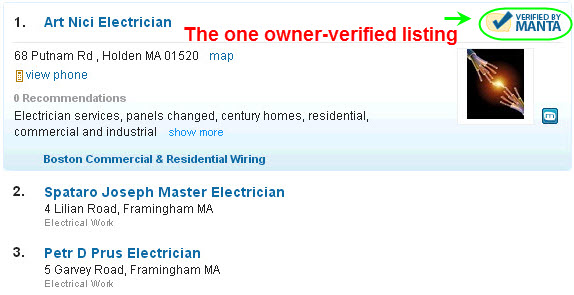IYPs – short for “Internet Yellow Pages” – get a bum rap.
Some of it is true:
Yes, they’re directories, not search engines.
Yes, some of them are mere flies on the windshield of Google.
Yes, we often harbor murderous fantasies when one of their sales representatives calls us on the phone.
It’s for all these reasons and others that most business owners pay little attention to these sites.
This makes sense on one level: these sites don’t have nearly as much “eyeball share” as Google does.
But it’s a mistake. If you’re in a competitive local market, you’re going to want every edge you can get.
More specifically: you’ll want every promising eyeball you can get (not to sound creepy or anything). On the whole, many people use IYP sites – partly because Google usually ranks them above or right below its own local search results.
That’s why you need to know basically how these third-party directory sites rank their business listings: as on Google, on these sites there are visible businesses and invisible ones. You want yours to be in the first group.
These sites influence your Google+Local rankings, too, but that’s another story.
I recently spent a few hours trying to figure out what separates some businesses from others on 7 of the biggest IYP sites. I’ve listed the sites in alphabetical order, with the ranking factors for each underneath.
Here are the ranking factors I’ve found for each site:
(Please note: these simply are my observations, based on a few hours of gumshoeing and several years of helping my clients with local search.)
1. Reviews (AKA “ratings”). That’s it. One ranking factor.
In terms of how CitySearch ranks businesses, there is a very clear pecking order:
-“Best of CitySearch” winners (if there are any in a particular local market).
-Then businesses that havereviews, ranked in descending order of “CitySearch score” and/or number of reviews (more on this in a second).
-Then businesses with no reviews.
A little more detail:
Businesses that win the “Best of CitySearch” award tend to have some reviews, but I’ve seen winners that have 1 or 2, which leads me to believe reviews may not even be a factor in winning. My understanding always has been that there are judges – AKA “scouts” – who pick the winners, but I’ve always been unclear on the specifics (despite a couple of unanswered inquiries on my part). Whatever the case, BoC winners get the top spots.

Slightly farther down the totem pole are all the businesses with reviews. All of them rank above all the businesses without reviews.
How do all the businesses with reviews get sorted out? Well, that leads us to “CitySearch score.” It’s the equivalent of an “average rating” (like what you see on Google and Yelp). 100% is perfect. 75% may mean that 3 out of 4 customers gave you a positive rating – which they can do without actually having to string together a couple sentences in a review.

CitySearch ranks businesses mostly by score, but also by number of ratings.
CitySearch usually ranks businesses with 90% above ones with 85%, which in turn outrank the ones at 72%, and so on. You get the idea.
There are some exceptions to this: Occasionally a business with a 90% CitySearch score will outrank one with a 100%. In these cases, the number of ratings also seems to be a factor: a business with 95% based on 60 ratings may outrank a business with 100% based on 20 ratings.
But businesses with a score of 50% or more always outrank the ones that have a score below 50%
When several businesses have 100% scores (which is common), it seems that the one with the highest number of reviews/ratings will be at the top.
Given that your local competitors probably don’t include many or any “Best of CitySearch” winners, and that businesses without any reviews rarely are contenders on the site, your #1 task is just to rack up a couple of reviews on the site. (CitySearch reviews help you out on many other sites, too.)
![]()
1. Paid results. Businesses that pay get the top spots. Everyone else dukes it out based on:
2. Reviews. InsiderPages is similar to CitySearch in this way. All businesses with reviews outrank all the ones that don’t have any.
Here, too, the businesses are ranked based on the number of reviews they have and by order of average rating (e.g. 5-star average, 4-star average, etc.). But unlike on CitySearch, here the number of reviews seems to carry a little more weight than how high the average star rating is. It appears quantity matters a bit more than quality, in this regard.
![]()
1. Being “Verified by Manta.” Once you create your Manta profile, they call you up to make sure your info is accurate. I don’t recall ever having done this with my clients (maybe once or twice…don’t remember), but I believe it’s free.

2. Business name. If the name of your Manta listing includes a given search term or city name, you’ll probably rank highly for it. But do NOT mess with your business name just to grab an extra edge: it may hurt the all-important consistency of your “NAP” info across the web.
By the way, there’s no such thing as a “Manta review,” so reviews aren’t even part of the equation here. Probably all you can do to climb over a few competitors is owner-verify your Manta listing (again, with the caveat that I’m not 100% sure whether it’s free – not that it necessarily would be a bad use of a buck).

1. Paid results.
2. Business name.
3. Reviews (?). This is a bit unclear to me: although businesses with reviews generally seem to outrank ones that don’t, sometimes I’ll click on a listing with a star rating next to it and the actual listing page for the business won’t show any reviews (I have a theory about this, though). I do know, though, that MerchantCircle is no stranger to the occasional shenanigan. It’s definitely a good site to be on, and you’ll want to make sure your listing is complete and accurate. I just don’t really know the extent to which MerchantCircle reviews help you on the site (or in your Google+Local rankings).
![]()
1. Paid results. SuperPages seems to have a ton of businesses on-board with “sponsored listings” – to such an extent that the “basic” listings often are halfway down the page or lower.
2. Business name.
3. Categories. SuperPages has an unusually wide range of categories you can list your business under, but you can’t specify any custom categories. You can pick up to 5. It’s really worth taking a few minutes to make sure you pick them wisely. (One good practice is to check out which ones your competitors are using.)
4. Reviews. Relative to other sites, SuperPages doesn’t have an enormous amount of review activity – though certainly it would be smart to make sure you get a couple reviews on it. In effect, this makes the other 3 main ranking factors I’ve identified a little more important.

I did a whole post on Yelp ranking factors, as you may have seen. But here are the CliffsNotes on what seem to be the biggest ranking factors:
1. Existence of reviews.
2. Keyword-relevance of reviews
3. Categories.
4. Name of business.
5. Number of reviews.
6. Reviews by “Elite” members.
7. Check-ins via smartphone.
8. Quality of reviews.
(For more detail, check out the post.)
![]()
Let’s start this one off with some great observations by my good buddy Darren Shaw of Whitespark.ca:
I looked at some businesses ranking in yellowpages.ca a while back and it looked to me that the #1 thing was just to get a couple reviews. Any reviews. Most businesses didn’t have any reviews on the site, and the ones that did tended to rank. The trouble with yellowpages.ca is that they randomize the rankings on every page load. Refresh this a few times: https://www.yellowpages.ca/search/si/1/plumbers/Edmonton+AB
The items in blue are paid, and the items with pins are paid as well but a lower cost package. It looks pretty random.
I’m pretty sure that if you phone and talk to a sales rep at most directories, they’ll tell you exactly how the rankings are generated. Typically it’s paid level 1, paid level 2, paid level 3, then random non-paid with reviews possibly playing a role. They seem to randomize the various paid levels as well so that each business gets equal opportunity to rank #1 in their section.
Just for the sake of comparing notes, here are the YP ranking factors I’ve noticed:
1. Paid results. They’re everywhere. The only randomized results – the ones Darren mentions (above) – seem to be the paid results. The “basic,” free listings appear to rank the same way consistently – based on some of the ranking factors we’ve seen elsewhere.
2. Business name.
3. Categories.
4. Reviews. YP is an important site to your local-search efforts in a lot of ways – certainly if you’re in the US, but especially if you’re in another country. Even if you don’t give a hoot about how visible you are on YP, I do recommend getting at least a few reviews there.
—
Even if some of specific factors I mentioned were news to you, the takeaway messages from all of this shouldn’t be news:
1. Make dead-certain you’re listed on each of the above sites, spend a few minutes picking out the most-relevant categories you can for your listings, and try to get reviews on as many of the sites as you possibly can.
2. Although many ad packages are a waste (or an outright scam), don’t necessarily dismiss them out of hand. For instance, if there’s on IYP site where you have a ton of great reviews, getting more people to see that listing may pay off.
3. Whenever there’s an often-ignored to-do item that can set you apart on one specific site (like verifying your Manta profile), do it. Most of your competitors would rather kick back and shovel Pringles into their faces than take a few minutes to pick low-hanging fruit.
Do you have any thoughts on / experience with the sites I mentioned or with others? Any advice or suggestions? Leave a comment!